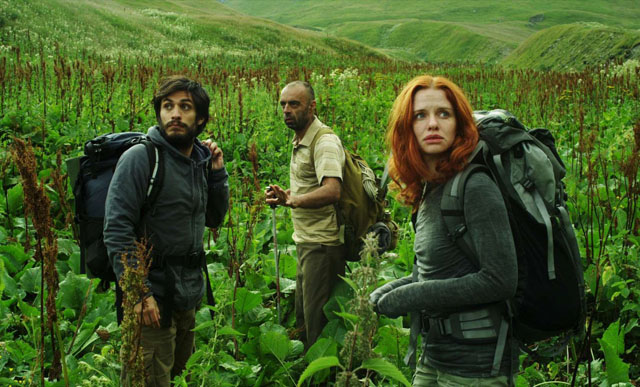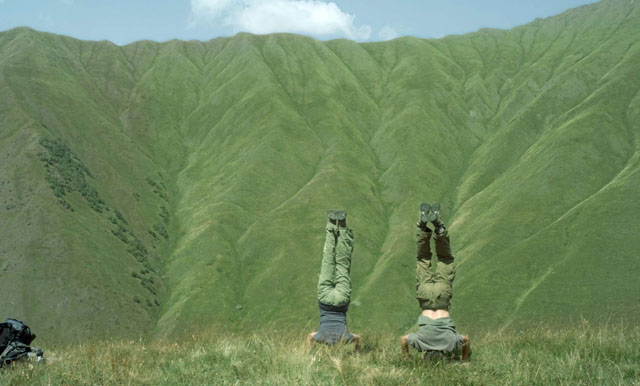Damon Smith introduces his conversation at Filmmaker with Julia Loktev “about defining moments, shooting in exotic locales, and the emotional qualities of sound” (you’ll remember that, earlier this week, we pointed you to two of Loktev’s early radio works at Film Comment): “Following up on her tense, distressingly visceral narrative feature Day Night Day Night, which anatomized the final hours of a female suicide bomber preparing for an operation in Times Square, Brooklyn-based filmmaker Julia Loktev leaves the cramped urban space of contemporary Manhattan for the majestic wilds of the Caucasus Mountains in The Loneliest Planet, where a Western couple, Nica (Hani Furstenberg) and her fiancée Alex (Gael García Bernal), have embarked on a hiking holiday in post-Soviet Georgia. Navigating their way through the emerald landscape with the help of a guide, Dato (Bidzina Gujabidze), whose war-scarred personal history seems to hang around his fatigued eyes like soot, Nica and Alex are game participants in their less-than-luxurious travel adventure, delighting in their ability to ‘rough it.’… The allure of the unfamiliar extends to language as well, both in the couple’s hapless efforts at communication with villagers as they attempt to arrange an expedition and in the cleaving of their own mother tongue.”
Karina Longworth in the Voice: “Loktev takes a painterly approach, crafting a study in colors—the vibrant green landscape, entire campfire-lit scenes registering as dances of shadow and warm flashes of skin, Furstenberg’s wild red hair filling the frame—as she also charts the variable shades and tones of a single relationship. Within a scantily plotted, novella-style narrative (the movie is an adaptation of a short story by Tom Bissell), single shots become story events that mere mention would spoil.”
“At almost precisely the midpoint,” notes Scott Tobias at the AV Club, “something happens. It only lasts about three seconds and represents the only major plot point in a film that has no interest in providing any more of them. Spoiling it here would diminish its power and surprise, but suffice to say, this pivotal event completely alters the characters’ understanding of each other and themselves, and turns the entire movie on a dime. There are times in everyone’s life that test their resolve and reveal who they are, and Loktev focuses with extraordinary acuity on the lead-up to and fallout from one such moment and where it leaves a couple in love.”
This moment in the middle is one that none of the critics I’ve read dares to spoil and, at Ioncinema, it brings to Blake Williams‘s mind Psycho (1960), the film that “invented the phenomenon of ‘hyped secrecy'”; he argues that “Loktev has effectively situated herself as the 21st century’s (M)inimalist heir to Hitchcock.” He dwells a bit, too, on the film’s “awareness for capital ‘M’ Minimalism,” elaborating on what he suspects is a reference to Philip Glass’s Einstein on the Beach.
“The Loneliest Planet was made with an intoxicating and precise faith in the ability of images to convey feelings that words would be too clumsy and blunt to appropriately delineate,” writes Alison Willmore at Movieline. “Its sophistication in its storytelling isn’t minimalism, exactly—the film never feels like it’s making a gimmick of its stretches of silence or choosing them over exchanges of dialog, but rather makes it clear that speech is unnecessary or inadequate. The film’s giant in scope, set against gorgeous wilderness, pulling back for periodic long shots in which the characters are tiny beside the splendid scenery. But its dramas are claustrophobic, defined in part by the presence of Dato as the outsider witnessing this implosion.”
“Working with a flattening telephoto lens and within an unconventionally chosen, but appropriately constrictive, 1.66 aspect ratio, Loktev and Chilean cinematographer Inti Briones (a frequent Raúl Ruiz collaborator) corrupt any notion of the postcard-perfect travelogue,” writes Brynn White for Film Comment. “Yet a sharp, immersive tactility pervades the film, as the characters shift towards and away from each other with no overarching sense of narrative progression—the cinematic promise of eventual escape—conjuring Manny Farber’s description of the Straubs’ shallow-space filmmaking as ‘both a feeling of cement blocks and extraordinary poetry at the same time.'”
More from Jordan Hoffman (Film.com, B), Anthony Kaufman (who, at Sundance Now, places The Loneliest Planet within the context of Loktev’s 1998 documentary Moment of Impact and her video installations), Erik McClanahan (Playlist, B+), Kristi Mitsuda (Reverse Shot), and Joshua Rothkopf (Time Out New York, 4/5). More interviews with Loktev: Dustin Chang (Twitch) and Steve Erickson (L).
Updates, 10/26: Loktev “isn’t exactly a disciple of Sergei Eisenstein,” notes J. Hoberman in Tablet, “but her approach is suggestive of an assertion Eisenstein made in his first published article ‘Montage of Attractions.’ He was writing on theater but soon applied his ideas to cinema: The medium’s ‘basic materials’ are found in the spectator and arise ‘from our guiding of the spectator into a desired direction (or a desired mood).’ Accordingly, the audience is subjected to a calculated series of surprises or jolts. That cine Loktev is, to some degree, predicated on the nature of shock (including the shock of “non-recognition”) may also have something to do with her childhood. The filmmaker was relocated at age 9, brought by her parents, both computer scientists, from the city then called Leningrad to deepest America (Loveland, Colo.). Thus transplanted, Loktev has perhaps taken as her mission a desire to unsettle, as The Loneliest Planet surely does with its account of two innocents abroad.”
Steve Erickson in Gay City News: “Like Abbas Kiarostami’s Certified Copy, Julia Loktev’s The Loneliest Planet, made in the republic of Georgia by an American director, feels like a 1950s or ‘60s European art film that just happened to be taking place now. In its use of landscape to express the psychological makeup of a relationship, The Loneliest Planet recalls Roberto Rossellini’s Stromboli and Voyage to Italy. However, there’s something very modern about it as well—a casual, unexplained globalism.”
The New York Times‘ A.O. Scott finds The Loneliest Planet to be “gripping and haunting, but also coy and elusive.”
Tom Hall interviews Loktev for Hammer to Nail.
Update, 10/27: More interviews with Loktev: Christopher Bell (Playlist) and Brian Brooks (Movieline).
Updates, 11/1: “There is some Borat in [Bidzina Gujabidze’s] guide,” finds the Stranger‘s Charles Mudede. “His sense of humor has no polish, and his view of the world lacks sophistication (the Japanese can be trusted; black Americans are crooks). But there’s some of Andrei Tarkovsky‘s Stalker in him as well. He is not guiding the couple through wild and scenic nature but, instead, to the spiritual twilight zone of their relationship.”
“Initially the tense and unpredictable story is intriguing, but it fizzles when nothing of substance manifests,” finds Catherine Haas in the Philadelphia City Paper.
Update, 11/12: Jonathan Robbins interviews Loktev for the Film Society of Lincoln Center.
For news and tips throughout the day every day, follow @KeyframeDaily on Twitter and/or the RSS feed. Get Keyframe Daily in your inbox by signing in at fandor.com/daily.





